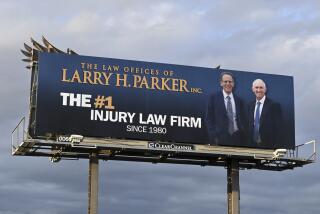S&L; Figure Tells of Kickbacks : Finance: Newport Beach businessman testifies at his federal trial that he didn’t think payments were illegal.
- Share via
LOS ANGELES — Newport Beach businessman Michael E. Parker, taking the witness stand Wednesday in his federal fraud trial, testified that he participated in a kickback scheme with thrift executives but did not think it was illegal at the time.
Parker acknowledged that his Newport Beach company, Parker North American Corp., kept a tally of both the real cost of its transactions with Columbia Savings & Loan Assn. in Beverly Hills as well as the inflated costs that he said were requested by thrift executives.
That way, he said, he thought he could protect his company in case the Internal Revenue Service or other agencies audited the thrift’s books and found the overpayments.
Parker was called as the final defense witness in the trial, testimony for which began March 17. He is charged with 39 counts that include racketeering, fraud, money laundering, tax evasion and conspiracy in connection with the operation of Parker North American in the mid-1980s.
The company arranged for banks, S&Ls; and other companies to lease equipment, mainly automated teller machines. It then sold both the leases and the equipment to investors, typically other banks and S&Ls;, in deals that provided the buyers with tax benefits. The indictment alleges that a number of lease packages sold to Columbia, which failed in 1990, were based on contracts and equipment that didn’t exist or had inflated values.
During questioning Wednesday, Parker stuck to his primary defense: that company Vice President Brian W. Fink, without his knowledge, involved Parker North American in lease arrangements for equipment that did not exist.
Parker also acknowledged paying kickbacks to former Columbia Vice President Jeffrey S. Worthy, saying that he considered the payments a condition of doing business with Columbia, Parker North American’s largest customer.
Parker, 45, testified that his company did $31 million in equipment lease business with Columbia and that $11 million from those transactions never showed up on the records. Parker said he received $8 million from the deals.
Under the arrangement with Worthy, Columbia would inflate the prices it paid for leases, Parker testified. Parker said he thought the arrangement “smelled,” but “I believed I would not do business with Columbia unless I paid Mr. Worthy.”
Assistant U.S. Atty. James R. Asperger said that on one occasion, Parker North American canceled its annual golf tournament, at which it had entertained bank and thrift executives. It did so, the prosecutor said, on the advice of a company lawyer who raised concerns that the event might violate federal statutes prohibiting gifts to bankers. Yet only a few days afterward, Asperger said, Parker gave Worthy a check for more than $85,000.
Parker said he never reported the money given to Worthy to the IRS or recorded it in company records. “It was my personal payment to Mr. Worthy,” he testified. “I did not think I had to report giving him the money.”
Parker also testified that he is broke.
Asperger had Parker display to the jury enlarged photographs of his 4,000-square-foot beachfront home on Balboa Peninsula. Parker explained that money to make $66,000 in payments on the house last year came from his father and from a bank loan.
Parker is expected to return to the witness stand today. Lawyers said closing arguments in the case could come as soon as Friday.
More to Read
Inside the business of entertainment
The Wide Shot brings you news, analysis and insights on everything from streaming wars to production — and what it all means for the future.
You may occasionally receive promotional content from the Los Angeles Times.










